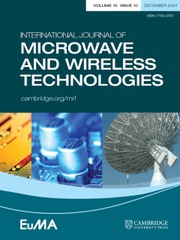Crossref Citations
This article has been cited by the following publications. This list is generated based on data provided by Crossref.
Elbellili, Taieb
and
Azizi, Mohamed Karim
2017.
Study of perfect imaging by coupled negative refractive index lenses using WCIP method.
p.
157.
Elbellili, Taieb
Azizi, Mohamed Karim
Latrach, Lassaad
Trabelsi, Hichem
and
Baudrand, Henri
2018.
Modeling and analysis of metamaterial lenses based on lumped circuits by using a wave concept iterative method.
International Journal of Microwave and Wireless Technologies,
Vol. 10,
Issue. 2,
p.
253.
Ammar, Noemen
and
Baudrand, Henri
2019.
The wave concept iterative process (WCIP) method for electrical circuit network with triangular and hexagonal topology.
International Journal of Circuit Theory and Applications,
Vol. 47,
Issue. 8,
p.
1340.
Karim Azizi, Mohamed
Elbellili, Taieb
Baudrand, Henri
and
Trabelsi, Hichem
2019.
Transmission line approach of zero-index metamaterials and applications using a wave concept iterative method.
International Journal of Microwave and Wireless Technologies,
Vol. 11,
Issue. 3,
p.
244.
Hlali, Aymen
Oueslati, Afef
and
Zairi, Hassen
2021.
Numerical Simulation of Tunable Terahertz Graphene-Based Sensor for Breast Tumor Detection.
IEEE Sensors Journal,
Vol. 21,
Issue. 8,
p.
9844.

